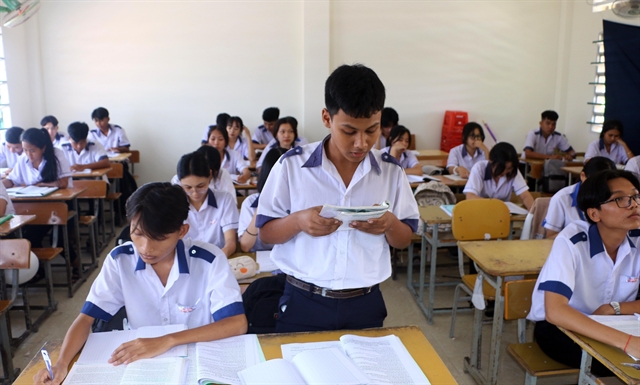
|
| Khmer students study at the Phú Tâm High School in Châu Thành District, Sóc Trăng Province. — VNA/VNS Photo Tuấn Phi |
HÀ NỘI — Education in ethnic minority areas in the Cửu Long (Mekong) Delta has brought about positive changes in the past years, according to the Government’s Committee for Ethnic Minority Affairs.
The quality of teaching and learning has been significantly improved and the rate of students going to school is high.
These improvements are helping to narrow the gap between urban and rural areas.
The achievements are thanks to the efforts of authorities at all levels, and timely and appropriate policies for ethnic groups.
Optimistic results
Boarding schools for ethnic students in the region operate effectively. Policies on recruitment, vocational training and ethnic literacy are well carried out, and the number of ethnic students is increasing, said the committee.
The region also has the only university on Khmer language, culture and arts in the country, which is the Trà Vinh University.
A typical example is Sóc Trăng Province.
After nearly three years of implementing the national target programme for socio-economic development of ethnic areas in the period 2021-25, with an allocated fund of nearly VNĐ194 billion (US$7.9 million), the province added and upgraded teaching equipment for a number of boarding schools.
Now all schools are solidly built and the province has no temporary schools or classrooms.
Sóc Trăng Province has 10 boarding schools for ethnic groups, with over 3,000 students.
So far seven schools in Kế Sách, Châu Thành, Mỹ Xuyên, Long Phú and Thạnh Trị districts were repaired, with investment of about VNĐ122 billion ($5 million).
The province strives to have all boarding schools for ethnic groups meeting national standards by 2025, according to the local development orientation.
It also has nearly 150 Khmer language schools with about 42,000 students.
Director of the Sóc Trăng Department of Education and Training Châu Tuấn Hồng said that the province always prioritised investment in education and training in ethnic group areas to narrow the gap between regions.
It ensures conditions for sustainable education and considers the work an important solution to improve the quality of human resources to serve local socio-economic development.
Trà Vinh Province is another outstanding locality.
More than 30 per cent of the province’s population are Khmer people.
In the 2023 – 2024 school year, the province has about 75,000 Khmer students, accounting for more than 35 per cent of the total.
Every year, about 2,500 Khmer students in the province study in universities and colleges.
Thạch Mu Ni, Deputy Head of the provincial Committee for Ethnic Minority Affairs, said that the province had set up a project to develop schools and classes to serve high-quality human resources education and training in ethnic group areas.
It built eight ethnic boarding schools and Pali-Khmer intermediate schools in areas with large Khmer populations such as Trà Cú, Cầu Ngang and Châu Thành districts.
In 2020, Trà Vinh completed a set of Khmer textbooks and distributed them to schools.
To date, Khmer language is taught in 121 out of 296 schools in the province.
A total of 130 out of 143 pagodas in Trà Vinh have Khmer language classes for people. These classes are managed by monks in the pagodas.
Quality and equitable education
At the conference on education and training development in the Mekong Delta to 2030, with a vision to 2045, organised by the Ministry of Education and Training in Cần Thơ City recently, Minister-Chairman of the Committee for Ethnic Minority Affairs Hầu A Lềnh said that the Mekong Delta has 43 ethnic groups, of which the largest are Khmer and Chăm.
However, so far, only 47 per cent of schools for them meet national standards.
Therefore, the Minister proposed the Ministry of Education and Training and localities devise solutions so ethnic groups have equal opportunities to access good education.
Localities need to improve the quality of teachers and educational managers in ethnic group areas, ensuring enough teachers for each education level and subject.
The teaching staff must meet the requirements of education and training innovation.
Investment in ethnic group areas should be prioritised to ensure quality and equitable education and promote lifelong learning opportunities for everyone.
Director of the Sóc Trăng Department of Education and Training Châu Tuấn Hồng said that besides giving preference to ethnic group areas, the province applied information technology in management and teaching.
Sóc Trăng promotes fostering teachers of ethnic languages, especially those with university degrees.
Learning promotion associations at all levels work with the Fatherland Front and other organisations to encourage people to build learning families, learning lineages and learning communities.
Kiên Giang Province has another solution.
Since 2010, it has recruited more than 400 ethnic students to universities and colleges. After graduating, those students will be given priority to work in organisations in their homeland. — VNS
- Reduce Hair Loss with PURA D’OR Gold Label Shampoo
- Castor Oil Has Made a “Huge” Difference With Hair and Brow Growth
- Excessive hair loss in men: Signs of illness that cannot be subjective
- Dịch Vụ SEO Website ở Los Angeles, CA: đưa trang web doanh nghiệp bạn lên top Google
- Nails Salon Sierra Madre
 VnExpress News The News Gateway of Vietnam
VnExpress News The News Gateway of Vietnam





